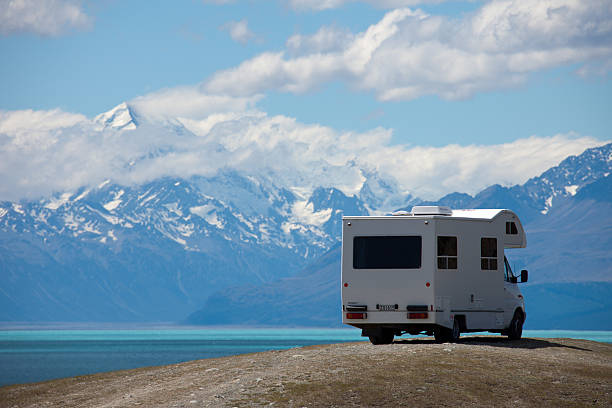The RV rental market is evolving fast—and the next 10 years will reshape the industry in ways we’re only beginning to understand. From AI-powered guest experiences to fleet-backed financing and the rise of fractional ownership, rental management is no longer a side hustle. It’s becoming a fully fledged investment class.
In this forward-looking article, we’ll outline the trends, technologies, and structural changes that will define the future of RV rental management—and what owners, operators, and fleet managers need to do now to stay ahead.
Table of Contents
- RV Ownership Will Shift Toward Income-First Thinking
- Managed Rentals Will Replace DIY Models
- Fractional RV Ownership Will Go Mainstream
- Rental Portfolios Will Become Tradable Assets
- Guest Expectations Will Match Hotel Standards
- AI Will Replace 80% of Guest Communication
- EVs and Eco-RVs Will Become Fleet Staples
- Platforms Will Consolidate—But Brand Control Will Matter
- National Brands and Franchise-Style Fleets Will Rise
- What Owners and Managers Should Start Doing Now
1. RV Ownership Will Shift Toward Income-First Thinking

In the past, RV purchases were driven by emotion: freedom, nostalgia, or a dream vacation. But a new wave of buyers is entering the market with different priorities.
In the next decade, most RV buyers will ask “How quickly can this rig pay for itself?” before they ask what color the cabinetry is.
Income-first ownership means:
- Evaluating ROI before choosing a model
- Buying based on rental demand, not just personal taste
- Using platforms, financing, and tech to generate predictable cash flow
This will change how RVs are marketed, financed, and configured.
2. Managed Rentals Will Replace DIY Models
DIY rentals may still exist, but they will become the minority. Why?
- Guest expectations are rising
- Managing listings, cleanings, and communication is time-intensive
- Tech automation requires integrated systems
The future is hands-off for owners, powered by:
- Territory Managers and regional operators
- Fleet dashboards and automated SOPs
- Rental agreements, inspections, and cleanings handled on autopilot
Owners will increasingly treat their RVs like Airbnb properties—outsourcing the work and collecting the income.
3. Fractional RV Ownership Will Go Mainstream
With the average new RV approaching $100,000, fractional ownership offers a new way in:
- Buyers split ownership (similar to timeshare or real estate syndication)
- A management company oversees storage, maintenance, and rentals
- Revenue is split proportionally
This model will appeal to:
- Lifestyle investors who want access without full cost
- Second-home buyers who want utility and yield
- People interested in RV investing without day-to-day management
Expect platforms to emerge that tokenize or structure these shares for maximum flexibility.
4. Rental Portfolios Will Become Tradable Assets
Like vacation rentals and car fleets, rental RV portfolios will become valued, financed, and sold based on cash flow.
We’ll see:
- RVs bundled and sold as income-generating assets
- Valuations based on earnings history, not just NADA value
- Financing based on rental income, not owner credit
Lenders, investors, and even REIT-like funds will enter the space.
This unlocks exits for fleet operators and gives owners another reason to build a track record of clean, consistent performance.
5. Guest Expectations Will Match Hotel Standards

In the coming years, renters will expect:
- Instant booking confirmation
- 24/7 support
- Cleanliness guarantees
- Smart onboarding (videos, QR codes, mobile instructions)
This shift is already happening—and only professionalized operators will keep up. DIY hosts with long delays, poor handovers, or inconsistent experiences will get buried in the search rankings.
To win in the future, you’ll need:
- Tech-driven SOPs
- Reputation management
- Brand consistency across units and territories
6. AI Will Replace 80% of Guest Communication
Artificial intelligence will soon handle the majority of interactions across the guest journey:
- Pre-trip FAQs
- Upsell and add-on offers
- Trip reminders and walkthrough instructions
- Post-trip review requests
Owners and managers will only step in when necessary, freeing up massive amounts of time while improving guest experience.
Platforms and management companies that build AI tools into their workflow will lead the next era of guest-centric rentals.
7. EVs and Eco-RVs Will Become Fleet Staples
By 2030:
- EV charging will be widely available at major campgrounds
- Solar, compost toilets, and lithium systems will be baseline
- Electric drivetrains will be common in vans and tow vehicles
Renters will demand:
- Sustainability as a standard
- Quiet, off-grid-ready systems
- Emissions-reduced road trips
Fleet managers who embrace this trend will:
- Charge premium rates
- Win loyalty from eco-conscious travelers
- Build strategic partnerships with green brands and destinations
8. Platforms Will Consolidate—But Brand Control Will Matter
Expect the big players (Outdoorsy, RVshare, RVezy) to consolidate, leaving fewer platform options for exposure.
But this will also increase fees and reduce owner control.
Operators who build their own brand (or co-brand with management services like RVM) will:
- Retain control of guest relationships
- Collect direct bookings
- Increase margins by bypassing third-party platforms
Owning your identity and direct booking channel will be key.
9. National Brands and Franchise-Style Fleets Will Rise
The industry will see the emergence of:
- National RV rental brands with consistent branding and processes
- Franchise-style operations where regional managers operate under a common umbrella
- Aggregated marketing, training, and support systems
This structure allows for:
- Scalability without sacrificing quality
- Regional flexibility with national reach
- Easier onboarding of new TMs, owners, or fleet partners
It’s the Airbnb PM model applied to mobile hospitality.
10. What Owners and Managers Should Start Doing Now

To stay ahead of this curve, here’s what you should do in the next 12 months:
- Automate: Adopt systems that handle bookings, communication, and maintenance tracking.
- Specialize: Consider investing in niche units—eco builds, luxury interiors, remote-ready vans.
- Diversify: Explore fractional or co-ownership partnerships.
- Brand: Build your digital presence beyond the platforms.
- Track performance: Keep unit-level income and expense records to enable financing, valuation, and resale.
The future of RV rental management is not about more hustle.
It’s about smarter systems, stronger brands, and scalable value.
At RV Management USA, we’re already building the tech, strategy, and team you’ll need to thrive in the decade ahead.
Let’s create what’s next.
– RVM Team

